#some of these are postwar the dancing one said 1947
Explore tagged Tumblr posts
Text
1940s photos with Buck and Bucky vibes
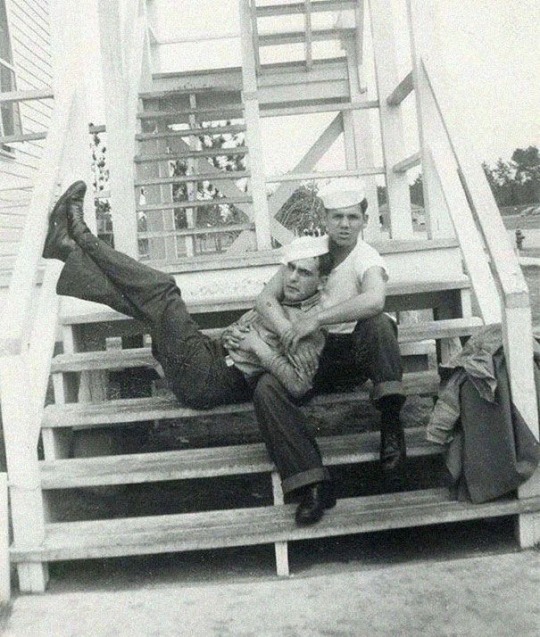
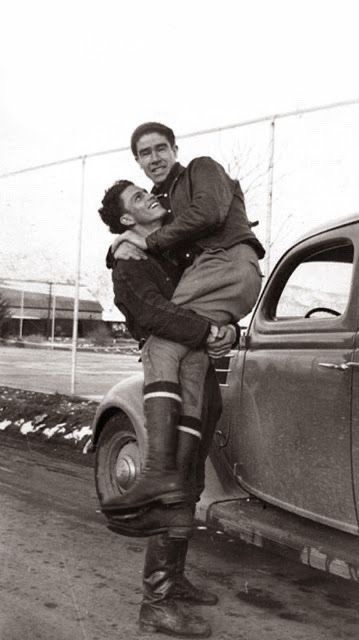
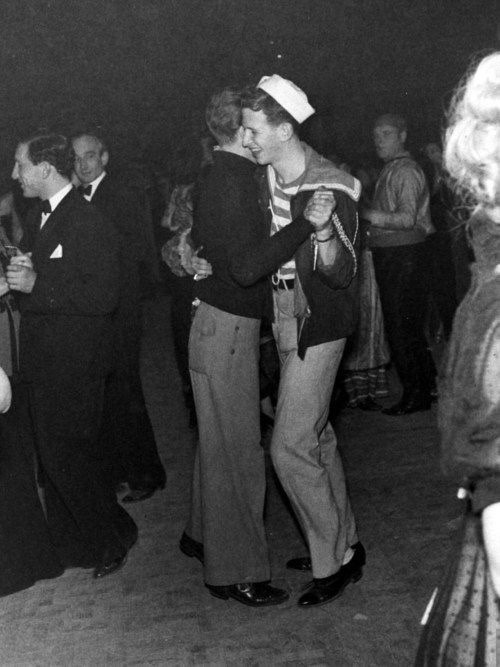

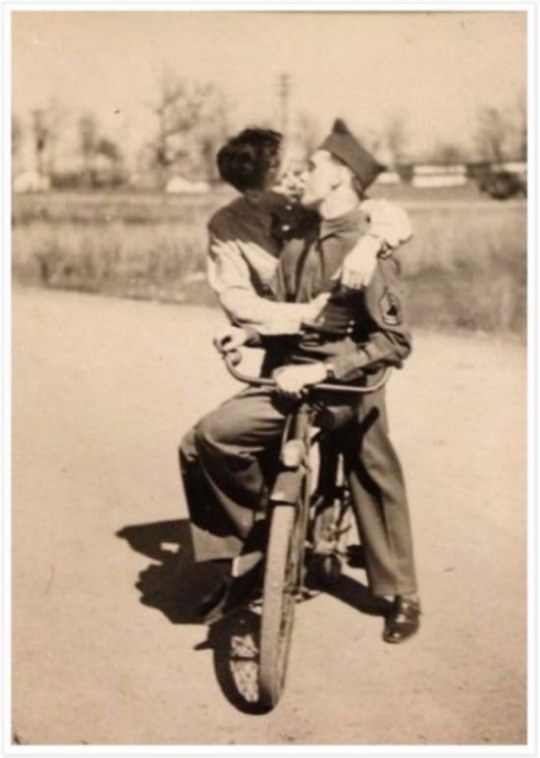
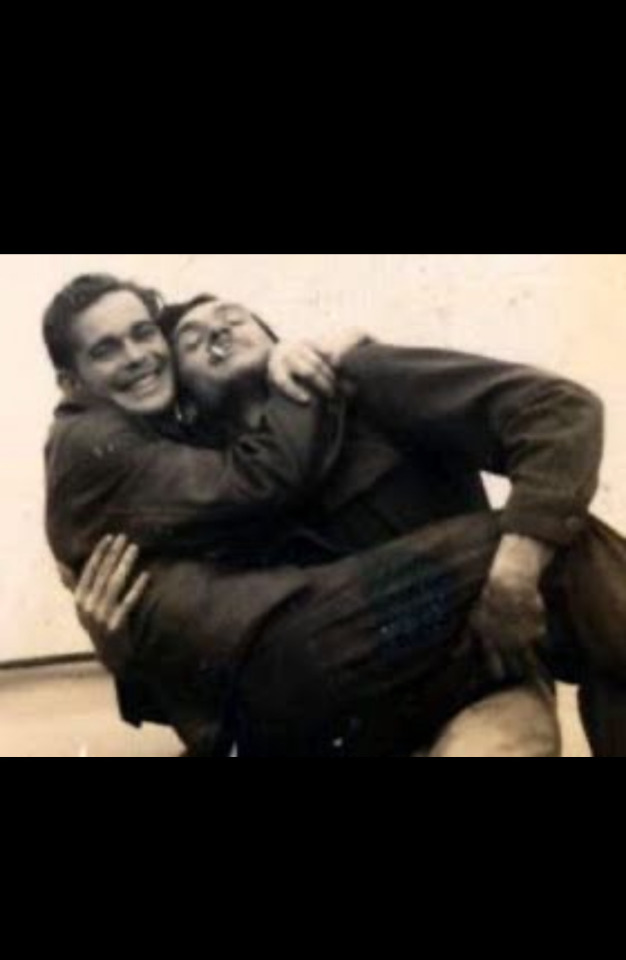
#happy peeps looks at those grins#some of these are postwar the dancing one said 1947#I’m feeling the fic inspiration already#clegan#Buck x Bucky#mota#if any of y’all artists draw these I’ll be indebted for life
374 notes
·
View notes
Note
perhaps this is in bad faith, but don't you think it's plausible that ms appleton was just a government food scientist who was sent to japan as sort of U.S. ambassador and given a generic, americanized name? we know that resources were scarce during the war and that many changes had to be made, or simply were made to cut costs, in the production of lots of things at the time. it just makes sense when you break it down that traditional shoyu is time and labour intensive to make but improves the taste of even outright bad dishes. at a time when people were forced to eat whatever food was available to them demand was likely very high to the point of unreasonably outweighing supply. either officials at kikkoman reached out to american food scientists for a solution or they offered one up themselves, given the fact that food science was undergoing a huge international renaissance led by the americans during the 30s, 40s and 50s. americans have a tendency to synthesize food. they also tend to feel strongly about imposing their culture on other countries. it seems more to me like this is a story about the american government taking extra steps to obfuscate the story of how they semi-successfully tried to be the final nail in the coffin of widespread, traditional shoyu production. less like some kind of yakuza conspiracy somehow centred on one woman. just the perspective of someone who's felt compelled to do their own research. it's my opinion that the way you're presenting your findings leaves massive gaps as well as leaps to get over them. i can't speak for the things you haven't shared publicly, obviously, but it feels a lot like you're dancing around the point. good luck to you in your research, regardless of my own feelings.
I think I agree that you're either arguing in bad faith or simply aren't really paying attention to a wider picture here. It's common knowledge that postwar economics in Japan were heavily influenced and remain to this day connected to organized crime and the Yakuza as an old tool of the imperial/noble order. We also know for a fact that the CIA worked with the yakuza during American occupation in order to manipulate political culture and economic structures.
It's also a common conspiracy in Japanese circles (or at least so it appears, and I want to be clear I am not voicing this as more than preexisting theory/belief, so I will not directly source to give complete credibility; consider this as context for why I might be interested in investigating further, just in case) that Empress Michiko and the Seifun Milling Company had close under-the-table connections with America, which would further influence the traditional shoyu brewing culture.
Like, I feel as though if you seem to be aware enough that America's treatment of Japan was one of extreme hostility and cruelty with little-to-no care about the nation or its people, solely using it as a means to enforce American/Western ideals and principles onto an unwilling populace and using violence and illegal organized crime syndicates to fulfill those goals...then why are you acting as though it's sus of me to look at a single woman in 1947 having this much power/control over Japanese-American relations when you have said yourself that shoyu is the single most important ingredient for Japanese food of all time, and only moreso during war rations/scarcity times?
#the mysterious appearance of miss appleton#like man i don't really wanna actually accuse you of bad faith#but i feel like if you aren't then you're in the area of being accused for myopic#and not paying attention to the surrounding details of a historical period and how that would imply and infer certain things#like. you're smart enough to call the cruelty of america to japan into play#and you're smart enough to point out how soy sauce is a big deal#but you're somehow finding me going ''hey why does one random woman get to control this entirely during military occupation? thats weird''#and then going ''okay so we already know she's tied to a general who is involved with the conspiratorial M-Fund''#''and she's tied to a different general who is tied to extreme cruelty in his command against Japanese''#''and she's part of an invading and occupying hostile conquering nation who has in the past and in the future#consistently and constantly shown that they work with local terrorist groups organized crime syndicates private militias/armies and so on#in order to fuck over their international rivals''#somehow you can't seem to find it reasonable that there's some heavy circumstantial evidence that warrants looking into?#hm?
231 notes
·
View notes
Note
If you still fancy a drabble prompt, I've always seen Canada and England having a very warm and comfortable relationship- if it interests you, maybe a prompt could be one going to the other for advice about something?
It does indeed interest me, thank you for the prompt! I've had a bunch of Mattie-Arthur scenarios swimming around in my mind for a long time, so I'm glad to have a chance to put one of them down on paper. As always, this was supposed to be a "drabble" but magically lengthened itself the more I thought about it -- I don't think drabbles are supposed to have historical notes.
"Come in."
Matthew shifted his pile of papers to his other arm and pushed through the door of Arthur's office. Inside, the fading afternoon light illuminated the rich mahogony floor and danced on the spines of the hundreds of books that lined each wall. Remembering the excitement he felt when he was first allowed to peruse these shelves, Matthew couldn't help but smile softly to himself.
Arthur himself sat at his desk, one ankle propped up on his knee as he stared idly out the window. Matthew could just barely see a white trim of bandages that peeked out from underneath his collar. That dimmed his smile. It had been more than two years now since the war had ended in Europe, but Arthur still looked as gaunt as he did during the days when engines still roared over London and — though Matthew had not thought it possible — even more exhausted. The worn smile Arthur offered him said as much, and Matthew pushed away a twinge of guilt.
Arthur jerked his chin at the seat in front of his desk and Matthew sat, stacking his documents in a neat pile in front of him. Instead of immediately going through them, however, he gazed worriedly at his old guardian.
"How are you feeling?"
Arthur sighed and shifted in his seat, dropping his leg and turning to face Matthew. He stared at the ancient, ink-stained wood of his desk for a while, and Matthew could almost see the warring emotions on Arthur's face as his desire to be honest fought with his lingering instinct to conceal and protect Matthew from the worries that plagued him. But because they were past such pretenses, he finally murmured, "Tired."
Matthew hummed sympathetically in response. There wasn't much he could do or say to change that, and he expected the reports he brought would only exhaust Arthur further. So he merely asked, "Are you remembering to apply the salve twice a day?"
Matthew flushed a little when Arthur rolled his eyes at him good-naturedly, realizing he was fussing like Arthur was his child, instead of the other way around. Thankfully, Arthur spared him further embarrasment by only answering a tad dryly that yes, he was actually capable of following simple instructions. Matthew mumbled out a reply before deciding that he might as well get on with what he was actually here for, knowing Arthur had never been one for small talk. Clearing his throat, he slid the top half of his stack of papers across the desk.
"They sent you a copy of Lord Mountbatten's plan, I think with annotations, though I haven't gone through the whole thing. And this part is the proposal for the national flag. Also," he pulled a cream letter from the pile and passed that over as well, "India asked that you be there personally, in August," he finished.
Arthur hummed and rifled through the papers. Matthew couldn't quite read his expression. After a few moments, he stacked them again and placed them to the side, with the letter on top. "Thanks. I'll go through them later."
Matthew nodded. "And here I just summarized the letters and stuff from the others. I've left them back in the box, in case you wanted to read them yourself. There's not too much going on really. That you don't already know."
"Yes. Thank you. This is a great help, Matthew, truly."
"You're welcome," Matthew murmured, and watched Arthur scan the notes before setting them aside as well. His eyes traced the shadows underneath the other nation's eyes, before dropping back down to the cotton bandages around his neck. He wondered if Arthur was sleeping at all.
"Is there anything else I can do? I'm heading back to Ottawa next week, but if you need me to take over some stuff for a bit, I can stay longer —"
"No, no, it's fine," Arthur cut him off. "Like I said, I'm just a little tired, that's all. But all this," he waved a hand at the documents , "isn't anything new."
Matthew frowned. "Isn't it?"
"Hmm?"
"I mean, I know the paperwork isn't new, but, these," he drew a breath, "reforms, and the war, of course. That's — I mean. No one's, you know, had to deal with that, before."
Arthur frowned, and traced a finger along the edge of his desk, before sighing, "No, I guess not." He turned again to look out the window behind him. After several long moments, he said, quietly, "But it's not entirely unexpected, either. I just—" The corner of his lips jerked down, and for a moment it seemed as if he was almost in pain. He drew in a breath, and said, "It's just. Difficult. That's all. To—but." He stopped again, grimaced, as if at his own ineloquence. Finally, he said, slowly, as carefully as if he was embroidering the words onto the air between them, "The world is changing. Let us not stand in the way, lest they make us out to be fools."
Watching him struggle, Matthew found himself at a loss as well. Never had he imagined that Arthur — sharp-tongued, quick-witted Arthur, who could neither be bullied nor silenced, who could quote from more books than Matthew had ever read — would be scrambling for words. But then, as he watched Arthur's shoulders curve in towards himself like Matthew had seen a thousand times before in another stubborn, sandy-haired nation who also seemed to have endless words but never quite the right ones, he knew what he needed to do.
Smiling again, Matthew stood, drawing on Arthur's arm so he would turn to face him and said, "I think you need a hug."
Unnecessarily Long Notes are Unnecessarily Long
I didn't state the specific setting of this scene, but the timing of the historical events mentioned means it has to have been sometime between June and August of 1947. Despite the fact that Mattie says "not much is going on", my lord, a lot was going on in 1947; hence why Artie is doing his best impression of the walking dead. Besides the Indian and Pakistan independence movement, officially achieved in August 1947 which is alluded to (Mountbatten, or 3 June Plan, was the precursor to the Indian Independence Act of 1947), Europe was also going through complete social upheaval. To mention just a couple highlights: Germany was in such ruin it was said to have returned to the Roman ages, Britain was rationing harder than ever despite the war having ended, and of course Mr. Truman and Mr. Stalin were gearing up for the Great Showdown. A quote I like which captures the feeling of the time is from H.G. Wells: "[where] other civilizations rolled and crumbled down, the European civilization was, as it were, blown up." [quoted by Tony Judt, Postwar]. Also directly concerning Arthur was the issue of Palestine, which as we all know was and is contentious, to say the very least.
Arthur's attitude to decolonisation is...complicated. Clearly I went with a softer view here, but certainly not all (or even many) British held the view in 1947 that the Empire should be decolonized at all. Hence Arthur during this time was probably a raging hypocrite and, if he wasn't already, at least 50% psychologically unstable. However, I allowed Arthur a little dignity here, in part because he's 2000 years old and as such should have a tiny more perspective than us humans, and also because the weakness of the Empire was much more evident to those in government and the army. Even if it wasn't popular opinion yet, anyone with half a braincell could see that every day Britian didn't decolonize was costing them more than they could afford. Additionally, Britain did decolonise much, much faster than all the other powers and in a relatively peaceful and orderly manner, though what ensued in the countries they left behind was neither. I should also add that Matthew is not the most objective of narrators either -- Canada, despite being a former colony, was still strongly Anglophilic, especially right after WWII. Still, I hope ya'll won't begrudge Arthur a hug.
#hws england#hws canada#fic#ask#rainbowfruitpastilles#needcake i'm working on urs next#ngl urs is kinda hard#but thats what practice is about#in the meantime send more asks :D#this is fun#fun times with the commonwealth
76 notes
·
View notes
Text
ELLA FITZGERALD: The Best of the Songbooks: The Ballads
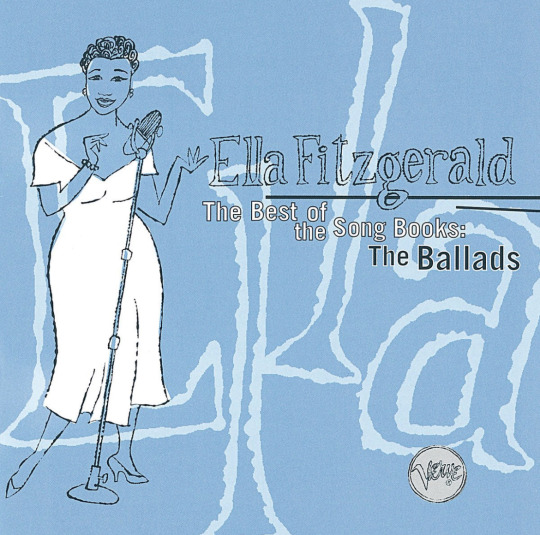
Even before Ella Fitzgerald became the First Lady of Memorex, the image prevailed of a finger-snapping, high-spirited vocal acrobat, spewing out bop syllables and falsetto notes with ease. Maybe that's fitting; after all, Ella will always be remembered for the bottomless joy she shared so generously with audiences, not to mention a youthfulness that seemed fueled by her sheer love of life.
This collection explores an undervalued side of her legacy: the one in which the tempo dropped, and her joy grew reflective or turned into grief. Ella's ballad singing entered its prime in 1956, when she recorded her double album Cole Porter songbook. Within a month that collection had found its way into 100,000 homes, turning her from a jazz cult figure into a pop icon. Seven more songbooks followed, devoted to Rodgers and Hart, Duke Ellington, Irving Berlin, the Gershwins, Harold Arlen, Jerome Kern, and Johnny Mercer - all told, a 245-song study of the music to which a whole country had grown up, danced, and fallen in love.
That era had ended by the time the series began, but the booming economy of the postwar years had made plenty of money available for projects like this. As a result, Ella got to work with the arrangers and musicians of her dreams. "I've always wanted to sing with lots of strings," she said happily after one session. The songbooks contain a wealth of great love songs to do those strings justice, not to mention the services of the ideal singer. Throughout her career Ella's ballads were often dismissed as lightweight; here are sixteen to the contrary. In each of them she displays her sensitive, conversational phrasing; flawless diction; endearing, childlike warmth; and utter simplicity of expression. Her melodic departures here are few but invariably memorable; she honors both the writers and her own integrity as a jazz artist.
Even at age forty-seven, when she recorded her last songbook for Verve, hers was not a voice of profound, lived-in experience. But many tantalizing ripples appear on its surface - a darkening of tone, the hint of a sob - that give her songs of love and heartbreak their credibility. So it is with these recordings, which offer convincing proof that Ella Fitzgerald was one of the most underrated ballad singers of her generation.
🎵 Oh, Lady Be Good!
This record did the most to establish Ella's jazz image - a 1947 bop vocal landmark for Decca that found her racing through the lyric on her way to a breakneck scat solo. In the George and Ira Gershwin songbook, however, she and Nelson Riddle brought unexpected meaning to this originally breezy show tune. Her final "Oh, please have some pity/l'm all alone in this big city", sung with a slight catch in the throat, captures all the poignance that made her ballads so affecting.
🎵 I'm Old Fashioned
Fred Astaire and Rita Hayworth danced on a moonlit terrace to this song in the 1942 film You Were Never Lovelier. It had long been a standard by 1963, when Ella and Riddle featured it in the Kern songbook. With the help of Paul Smith and his trio, Ella swings even at a near-ballad tempo.
🎵 Laura
From the Johnny Mercer collection comes an ethereal Riddle arrangement of the theme from Laura, Otto Preminger's 1944 film noir. The chart hangs upon a repetitive ascending phrase, as hypnotic as the ticking grandfather clock in the climactic scene. Preminger had initially chosen "Sophisticated Lady" to lead the score, but his composer David Raksin insisted that the title character - played by the ravishing Gene Tierney - needed a new theme. Challenged to write something over the weekend, a desperate Raksin made dozens of failed attempts. Not until the final hours did the opening phrase come to him; by morning he had his song. Mercer later added a dreamlike lyric, which Ella reads immaculately.
🎵 Day-Dream
In her darkest voice, Ella sings a ballad composed in 1940 by Duke Ellington and Billy Strayhorn. The surreal lyric, full of ghostlike images and mounting anxiety, is by John Latouche. As usual, Ella's phrasing is a model of clarity; listen to her reading of the potentially sing-songy "Don't know the time/Lordy, I'm in a daze". Johnny Hodges supplies the alto saxophone solo.
🎵 Easy to Love
This quartet arrangement provides a welcome relief from the desultory band charts that mar Ella's Cole Porter set. "Easy to Love" was first heard in the 1936 film Born to Dance, where Jimmy Stewart sang it to Eleanor Powell as they strolled through Central Park. It's a natural for Ella, who turns it into jazz with minimal improvisation. Years later, in a terse down beat interview, Porter named Fitzgerald and Louis Armstrong as the two jazz singers whose treatment of his work didn't offend him.
🎵 It Was Written in the Stars
The combination of Ella's cloudless voice and a somber lyric could yield surprising results. So it is with this clutching, neurotic love song, written by Harold Arlen and Leo Robin for the 1948 film noir Casbah. Arranger Walter Sheets places Ella amid a weighty brass section and a silvery, translucent layer of strings, echoing the irony of such lines as "It was written in the skies/That the heart and not the eyes/ Shall see".
🎵 How Long Has This Been Going On?
This exquisite ballad of romantic discovery was first heard in the 1928 Gershwin musical Rosalie; nearly thirty years later Audrey Hepburn gave it new life in the movie Funny Face. Its sexual overtones don't escape Ella, who grows especially misty when she sings, "There were chills up my spine/And some thrills I can't define"
🎵 Let's Begin
Ella makes an unlikely seductress in this Jerome Kern-Otto Harbach song from Roberta, as she boldly confronts the tease who won't deliver. Dick Nash's trombone solo is a reminder of the jazz content that Nelson Riddle brought to these charts, most of which were aimed at) the pop market.
🎵 Now It Can Be Told
The most verbally concise of the classic pop composers could also be the most luxuriously romantic, as Irving Berlin proved with this song. Introduced by Alice Faye in the 1938 film Alexander's Ragtime Band, it elevates a new love to the level of \majesty. Even an unadorned reading such as this one bears Ella's unmistakable stamp; witness her airy descent on her repeat of the phrase "as an inspiration" or her slide up to the final "told". Here and throughout the Berlin songbook, Paul Weston's Hollywood-style strings rival Nelson Riddle's for pure lushness.
🎵 There's a Small Hotel
From Ella's Rodgers and Hart collection comes this fantasy for young lovers, written for On Your Toes in 1936. Discussing that second songbook, Ella said: "We didn't have to rush it like we did the Cole Porter, so I think the whole thing is more relaxed." Richard Rodgers approved: "Whatever it is Ella does to my songs, they sound better."
🎵 Do Nothing till You Hear from Me
A highlight of the small-group sessions that comprise half of the Ellington set, this usually hasty song of denial becomes as calm and reassuring as a lullaby in Ella's hands. Starting with the rare verse, she and an all-star sextet give this Ellington-Bob Russell gem a loving eight-minute examination. Ben Webster and Stuff Smith offer leisurely solos.
🎵 I’ll Wind (You're Blowin' Me No Good)
This tale of trouble afoot was written by Harold Arlen and Ted Koehler for the Cotton Club Parade of 1934. Ella sings it as dejectedly as a child left out in the cold. The plush settings that Riddle and Weston had given her are gone, replaced by dark-hued horns and icy strings.
🎵 You're Laughing at Me
"Nothing hurts like young love that's been slapped in the face," said the great café singer (and Fitzgerald favorite) Mabel Mercer in 1975. Ella understood that, as did Irving Berlin. This song, which Dick Powell sang in the 1937 film On the Avenue, sums up the pain of a love dismissed as a joke: "While I'm crying for you/You're laughing at me."
🎵 A Ship Without a Sail
No lyricist caught the heartache of broken illusions better than Lorenz Hart, who spent his life yearning for the love he wrote about so knowingly. Rodgers and Hart's score for the 1929 musical Heads Up! featured this ballad about a soul much too tender to have "a faded dream to sell."
🎵 Travlin' Light
This world-weary torch song by Jimmy Mundy, Trummy Young, and Johnny Mercer made its first appearance on a Capitol 78 in1942. Its label reads: "Paul Whiteman and His Orchestra; vocal chorus by Lady Day". Why Miss Holiday was billed by her nickname is still a mystery, but 1 thereafter the song belonged to r her. It may seem like an ambitious choice for Ella, but it clearly strikes a meaningful chord in her. Mercer's spare lyric leaves much unsaid but not unfelt: "No one to see/l'm free as the breeze/No one but me/And my memories."
🎵 This Time the Dream's on
Arlen and Mercer wrote this song for Blues in the Night, a 1941 movie musical. A brave ballad about biding one's time for a hopeless dream, it contains one of the more heartbreaking images in popular song: "It would be fun/To be certain that I'm the one/To know that I at least supply the shoulder you cry upon". Ella may have kept her tears to herself, but performances like this allow a look at what really lay inside her heart.
James Gavin March 1994
James Gavin's profiles of jazz and pop music personalities appear in the New York Times, the Village Voice, and other publications.
1 note
·
View note
Text
New Books Coming Your Way, May 9, 2017
My Soul Looks Back: A Memoir by Jessica B. Harris 272 p.; Memoir In the Technicolor glow of the early seventies, Jessica B. Harris debated, celebrated, and danced her way from the jazz clubs of the Manhattan's West Side to the restaurants of the Village, living out her buoyant youth alongside the great minds of the day—luminaries like Maya Angelou, James Baldwin, and Toni Morrison. My Soul Looks Back is her paean to that fascinating social circle and the depth of their shared commitment to activism, intellectual engagement, and each other. Harris paints evocative portraits of her illustrious friends: Baldwin as he read aloud an early draft of If Beale Street Could Talk, Angelou cooking in her California kitchen, and Morrison relaxing at Baldwin’s house in Provence. Harris describes her role as theater critic for the New York Amsterdam News and editor at then burgeoning Essence magazine; star-studded parties in the South of France; drinks at Mikell’s, a hip West Side club; and the simple joy these extraordinary people took in each other’s company. The book is framed by Harris’s relationship with Sam Floyd, a fellow professor at Queens College, who introduced her to Baldwin. More than a memoir of friendship and first love My Soul Looks Back is a carefully crafted, intimately understood homage to a bygone era and the people that made it so remarkable. The Song Poet: A Memoir of My Father by Kao Kalia Yang 288 p.; Memoir Following her award-winning book The Latehomecomer, Kao Kalia Yang now retells the life of her father Bee Yang, the song poet, a Hmong refugee in Minnesota, driven from the mountains of Laos by American’s Secret War. Bee lost his father as a young boy and keenly felt his orphanhood. He would wander from one neighbor to the next, collecting the things they said to each other, whispering the words to himself at night until, one day, a song was born. Bee sings the life of his people through the war-torn jungle and a Thai refugee camp. But the songs fall away in the cold, bitter world of a Minneapolis housing project and on the factory floor until, with the death of Bee's mother, the songs leave him for good. But before they do, Bee, with his poetry, has polished a life of poverty for his children, burnished their grim reality so that they might shine. Written with the exquisite beauty for which Kao Kalia Yang is renowned, The Song Poet is a love story—of a daughter for her father, a father for his children, a people for their land, their traditions, and all that they have lost. A Rising Man by Abir Mukherjee 400 p.; Mystery Calcutta, 1919. Captain Sam Wyndham, former Scotland Yard detective, is a new arrival to Calcutta. Desperately seeking a fresh start after his experiences during the Great War, Wyndham has been recruited to head up a new post in the police force. He is immediately overwhelmed by the heady vibrancy of the tropical city, but with barely a moment to acclimatize or to deal with the ghosts that still haunt him, Wyndham is caught up in a murder investigation that threatens to destabilize a city already teetering on the brink of political insurgency. The body of a senior official has been found in a filthy sewer, and a note left in his mouth warns the British to quit India, or else. Under tremendous pressure to solve the case before it erupts into increased violence on the streets, Wyndham and his two new colleagues—arrogant Inspector Digby and Sergeant Banerjee, one of the few Indians to be recruited into the new CID—embark on an investigation that will take them from the opulent mansions of wealthy British traders to the seedy opium dens of the city. The Song and the Silence: A Story about Family, Race, and What Was Revealed in a Small Town in the Mississippi Delta While Searching for Booker Wright by Yvette Johnson 336 p.; Autobiography “Have to keep that smile,” Booker Wright said in the 1966 NBC documentary Mississippi: A Self-Portrait. At the time, Wright spent his evenings waiting tables for Whites at a local restaurant and his mornings running his own business. The ripple effect from his remarks would cement Booker as a civil rights icon because he did the unthinkable: before a national audience, Wright described what life truly was like for the Black people of Greenwood, Mississippi. Four decades later, Yvette Johnson, Wright’s granddaughter, found footage of the controversial documentary. No one in her family knew of his television appearance. Even more curious for Johnson was that for most of her life she’d barely heard mention of her grandfather’s name. Born a year after Wright’s death and raised in a wealthy San Diego neighborhood, Johnson admits she never had to confront race the way Southern Blacks did in the 1960s. Compelled to learn more about her roots, she travels to Greenwood, Mississippi, a beautiful Delta town steeped in secrets and a scarred past, to interview family members and townsfolk about the real Booker Wright. As she uncovers her grandfather’s compelling story and gets closer to the truth behind his murder, she also confronts her own conflicted feelings surrounding race, family, and forgiveness. Told with powerful insights and harrowing details of civil rights–era Mississippi, The Song and the Silence is an astonishing chronicle of one woman’s passionate pursuit of her own family’s past. In the stories of those who came before, she finds not only a new understanding of herself, but a hopeful vision of the future for all of us. After the Bloom by Leslie Shimotakahara 328 p.; Fiction Lily Takemitsu goes missing from her home in Toronto one luminous summer morning in the mid-1980s. Her daughter, Rita, knows her mother has a history of dissociation and memory problems, which have led her to wander off before. But never has she stayed away so long. Unconvinced the police are taking the case seriously, Rita begins to carry out her own investigation. In the course of searching for her mom, she is forced to confront a labyrinth of secrets surrounding the family’s internment at a camp in the California desert during the Second World War, their postwar immigration to Toronto, and the father she has never known. Epic in scope, intimate in style, After the Bloom blurs between the present and the ever-present past, beautifully depicting one family’s struggle to face the darker side of its history and find some form of redemption. An Extraordinary Destiny by Shekhar Paleja 384 p.; Fiction It’s 1947 in Lahore, and the Sharma family is forced to flee their home during the violence of the Partition of India. As the train tracks measure the ever-growing distance between Varoon and his mother, who vanished during the panic to escape, the boy is thrust towards an uncertain future. Forty years later, Varoon’s grown son, Anush, desperately tries to disentangle himself from his father’s demands, which are mired in grief and whiskey. Compounding the pressure is Anush's unusually auspicious kundali—a Vedic birth chart—which threatens to suffocate Anush with lofty expectations. But when he meets Nasreen, Anush feels he may finally be experiencing the incredible fate foretold by the stars. Until his father threatens to block his chance at true happiness. Threading artfully through three generations of an Indian family, An Extraordinary Destiny crafts an intricate narrative that reveals, in layers, how decades-old grief rooted in the trauma of history, and couched in familial duty and custom, threaten to sever the sacred connection between ancestors and descendants. May 05, 2017 at 11:00AM from ReadInColour.com http://ift.tt/2pOn5Kz
1 note
·
View note